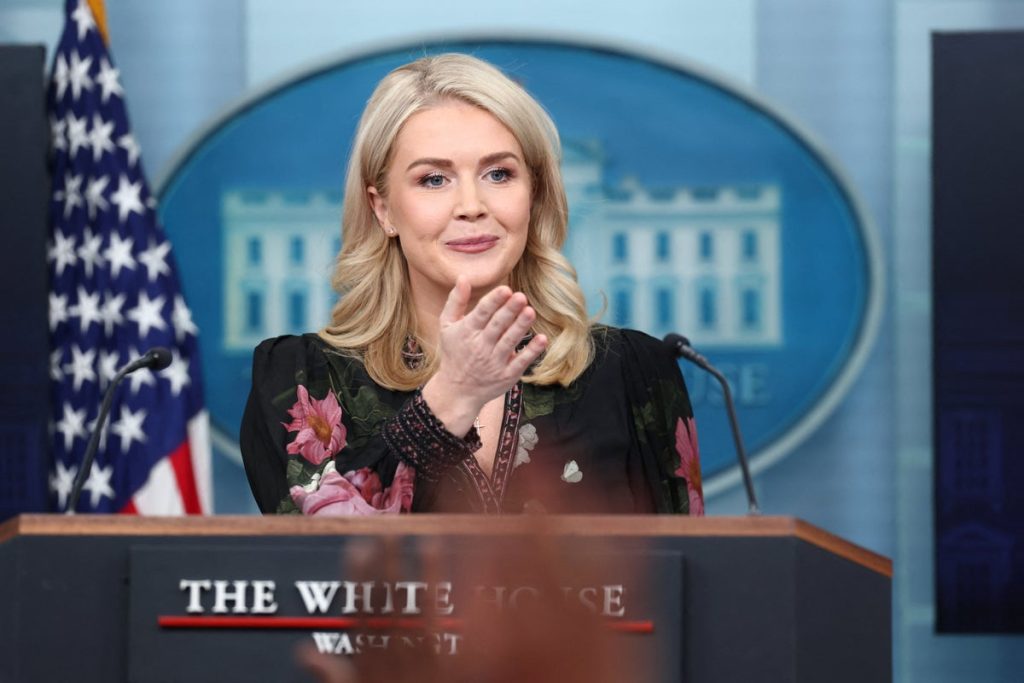Listen to the article
Donald Trump’s press secretary has launched a scathing attack on the BBC, labeling the British broadcaster a “leftist propaganda machine” in comments that signal a potentially hostile relationship between the UK’s public service broadcaster and a second Trump administration.
Karoline Leavitt, recently appointed as Trump’s press secretary for his 2024 presidential campaign, made the remarks on social media platform X in response to a BBC News article analyzing Trump’s performance at the presidential debate against Vice President Kamala Harris.
“The BBC is a leftist propaganda machine,” Leavitt wrote on Monday, responding to the broadcaster’s analysis that questioned Trump’s debate claims about immigration and the economy. Her comment marks one of the first direct confrontations between Trump’s campaign team and the British media organization during this election cycle.
The accusation echoes Trump’s longstanding criticism of mainstream media outlets, which he has frequently characterized as “fake news” throughout his political career. During his first term in office, Trump regularly clashed with journalists and news organizations, including CNN, The New York Times, and The Washington Post.
Media experts note that such public condemnation of the BBC by a potential future White House press secretary could complicate the broadcaster’s ability to cover a second Trump administration effectively. The BBC, which operates under a Royal Charter in the UK, has long prided itself on its commitment to impartial reporting and is funded primarily through a license fee paid by British households.
“This kind of rhetoric signals that a second Trump administration might continue or even escalate the combative approach toward media organizations that don’t provide favorable coverage,” said Dr. Melissa Jenkins, a professor of political communication at Georgetown University. “For international broadcasters like the BBC, this could mean restricted access or increased public criticism.”
The BBC has previously faced criticism from both sides of the political spectrum in the UK, with some conservative politicians suggesting it has a liberal bias, while others on the left have accused it of favoring establishment viewpoints. However, independent reviews have generally found that the broadcaster maintains reasonable balance in its political coverage.
The article that prompted Leavitt’s response had fact-checked several of Trump’s debate assertions, including claims about migrants from Haiti eating pets in Springfield, Ohio—allegations that local officials have repeatedly denied. The BBC analysis also questioned Trump’s statements about the U.S. economy and immigration policy.
Trump’s relationship with the UK media has been tumultuous throughout his political career. During his state visit to Britain in 2019, he refused to take questions from CNN, calling the network “fake news,” while also criticizing the BBC.
Relations between the U.S. and UK are traditionally described as a “special relationship,” with close cooperation on defense, intelligence, and trade matters. Media analysts suggest that antagonism toward British public service broadcasting could introduce an unusual tension point between the allies if Trump returns to office.
“The BBC’s global reputation is built on editorial independence and fact-based reporting,” said Richard Sambrook, former director of BBC News. “While all politicians occasionally take issue with media coverage, democratic governments typically respect the role of independent journalism, even when it’s critical.”
The Trump campaign has intensified its criticism of mainstream media coverage in recent weeks as the November election approaches, frequently directing supporters to alternative news sources and social media platforms for campaign messaging.
BBC officials have not yet publicly responded to Leavitt’s comments. The broadcaster typically refrains from engaging in political disputes about its coverage, instead pointing to its editorial guidelines that mandate impartiality and accuracy in reporting.
Media watchdog organizations have expressed concern about the potential chilling effect on press freedom if major international news organizations face regular public attacks from political leaders.
Fact Checker
Verify the accuracy of this article using The Disinformation Commission analysis and real-time sources.




7 Comments
The BBC is a respected global news organization, but it’s no surprise the Trump team would criticize it as ‘leftist propaganda’. Partisan rhetoric often dismisses media outlets that don’t align with one’s political views.
Calling the BBC ‘leftist propaganda’ seems like an exaggeration. The BBC aims for objectivity, even if its reporting doesn’t always align with a particular political agenda. Dismissing critical coverage as ‘fake news’ is a concerning trend.
It’s concerning to see the Trump team attacking a respected global news organization like the BBC. While media bias is always a concern, labeling the BBC as ‘leftist propaganda’ seems like an exaggeration aimed at discrediting its coverage.
While I don’t agree with labeling the BBC as ‘propaganda’, it’s understandable the Trump team would be wary of its coverage. The relationship between political figures and the media can be contentious, especially in the current polarized climate.
The BBC is known for its commitment to impartial, fact-based journalism. Dismissing its coverage as ‘leftist propaganda’ is an attempt to discredit and undermine a respected news source. We should be wary of such partisan rhetoric.
While the BBC, like any news organization, may have some ideological leanings, labeling it ‘leftist propaganda’ seems like a stretch. We should be cautious of attempts to discredit media outlets that don’t align with a particular political agenda.
The BBC is known for its thorough, fact-based journalism. Labeling it ‘propaganda’ is a stretch and reflects the Trump team’s broader distrust of mainstream media outlets. A free and independent press is vital for democracy.